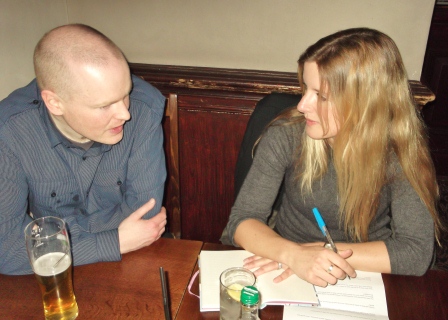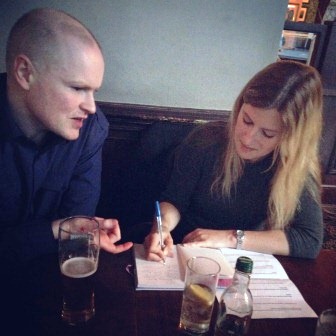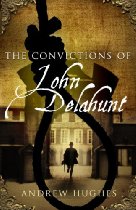Andrew Hughes is an archivist from County Wexford, Ireland.
Whilst researching his non-fiction work, a social history of the Georgian
houses in Fitzwilliam Square, Dublin, he discovered the story of John Delahunt.
The Convictions of John Delahunt is his
first novel. Laura Skippen has reviewed the novel [here]
and met the author on his recent visit to London.

LAURA SKIPPEN: What attracted you to this particular story during your research as opposed to all the
other interesting ones you discovered?
ANDREW HUGHES: Whilst I was researching my non-fiction work I came across
a reference to the murder of the Italian boy which was clearly a notorious
story at the time. The crown witness in the case was John Delahunt and from
there I found numerous newspaper reports that revealed the rest of his story.
It was an unusual enough story that when I was searching for inspiration for a
piece of work to take to my writing group it stuck in my mind and I began to
write about him.
LS: Are
you planning on using any of these other stories in future books?
AH:
I often check through old reports looking for the scandals of the time as
possible inspiration, but John Delahunt was such a strong story I felt he could
carry a whole novel. Many of the other stories are useful additions to give the
ring of truth to other stories but I haven’t planned any future work solely
around them yet.
LS: What
made you decide to use Delahunt’s voice rather than the third person?
AH:
It wasn’t really a conscious decision. I like the first person as a way of
really getting into a character. He is very self-aware and makes a lot of wry
comments on his behaviour so I could still take him a step away from his
actions. I also admire a lot of works written in that style, such as Notes from the Underground so it just
came naturally.
LS: Delahunt
has some redeeming features but essentially is a pretty amoral character. How
would you defend him?
AH:
The real-life Delahunt was a child-killer and it is pretty difficult to defend
that. It was a challenge to make him a sympathetic enough character that people
would want to read about him. I invented the character of Helen to show his
more human side. I suppose in his defence in the way I have written him he is a
man who could have gone in another direction, he is a victim of circumstance
and the brawl with the policeman is the first in a series of steps which traps
him in a downhill spiral. He finds himself in situations where he does the most
expedient thing at the time which isn’t always the most moral!
Helen has also
divided opinion. Although I originally thought of her as a purely sympathetic
character several people have commented that she has her dark side and that the
two characters together drag each other down. She became a strong character in
her own right.
LS: You
manage to keep a lot of suspense in the book despite the fact that the reader
knows what happens from the very beginning. How did you ensure this happened?

AH: I was writing with my fiction workshop
at the time and we had to bring work to the group each week to talk about. This
was how the book came about in the end. Writing in this way forces you to make
sure that there is something happening in every chapter as the group only gets
to read a few pages each week. I found writing like this and getting the views
of the workshop really helpful. I still meet with the group now.
LS: Are
you a crime fiction lover? Were you on the lookout for this type of
inspiration?
AH:
I didn’t originally think of this book as crime fiction and with my background
as an archivist I’d always thought of it as an historical novel. I’ve not read
much crime fiction but was inspired by John Banville’s The Book of Evidence and of course Crime and Punishment. So I suppose I went more along the lines of a
study of a sociopath rather than a classic whodunit. However I seem to be
getting drawn into the crime fiction world as my next novel is also features
historical crime.
LS: You’ve
actually had some flattering comparisons with John Banville. However he has
said that he hates all his books as they are all an embarrassment! How do you
feel about your book?
AH:
I’m not sure I’ve reached that stage yet! Receiving constant feedback
throughout the process meant that by the time it was finished I actually felt
like the book was complete. I don’t feel that I need to go back to it now; I’m
ready for the next one.
LS: Talking
of the next one….
AH: It is set in Dublin again but this
time earlier, in 1816, which was known as the year without a summer. There was
a volcanic explosion in south-east Asia which led to devastating environmental
effects and widespread famine in Ireland as crops failed. The freakish events
give the story a kind of noir setting. I’ve gone with a female central
character this time called Abigail Lawless, and it has been quite nice to write
a more uncomplicated sympathetic character.
LS:
With your
background as an archivist and all the research you have done on Dublin’s
historywill you be trying to use all this in your future books?
AH: I did do a lot of research for this
book and I do feel more comfortable writing with that element of knowledge as I
think the details are very important. I also like the way you can look at
attitudes during the time and the limitations these put on the characters. This
has been really true writing with a lady sleuth at the moment. On the other
hand I definitely think I could go further afield and not just stick in Dublin,
maybe for my third?
LS:
We are looking
forward to it!

Doubleday Ireland
RRP: £12.99 Trade Pbk
Released: 13th March 2014
Photos © Mike Ripley
abortion pills
website abortion pill buy online
why husbands cheat
open I cheated on my girlfriend
I cheated on my husband
site wives who cheat
abortion at 10 weeks
open abortion papers
bystolic coupon mckesson
site forest laboratories patient assistance
plendil 5 mg pret
link plendil 5 mg retard
viagra ersatz
read viagra generika
how many abortions can a woman have
abortion center abortion clinic in atlanta
cialis.com coupons
site cialis discount coupons online
priligy kokemuksia
priligy priligy resepti